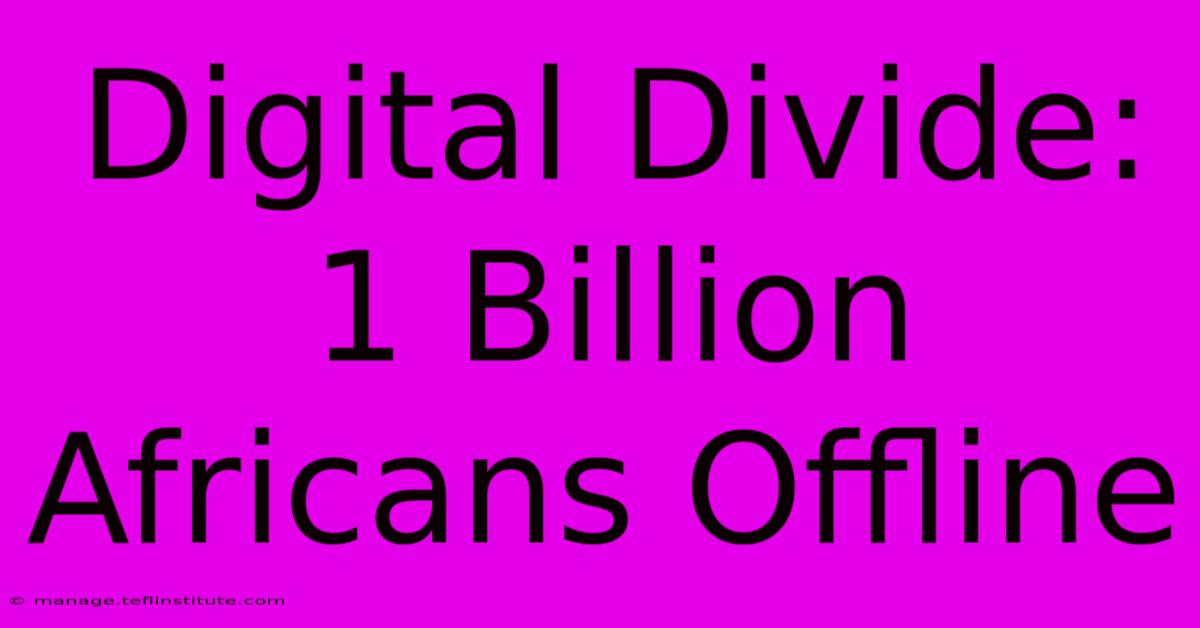Digital Divide: 1 Billion Africans Offline

Table of Contents
The Digital Divide in Africa: 1 Billion People Left Behind
The digital revolution has swept across the globe, transforming lives and economies. However, this progress has not been felt equally, leaving millions behind. In Africa, the digital divide is particularly stark, with a staggering one billion people lacking access to the internet. This exclusion has far-reaching consequences, hindering economic development, social progress, and individual empowerment.
The Cost of Being Offline:
The lack of internet access in Africa translates to a multitude of challenges:
- Limited Economic Opportunities: Without internet connectivity, Africans are denied access to online markets, digital skills training, and remote work opportunities, hindering their ability to participate in the global economy.
- Educational Disadvantage: Online learning platforms, research resources, and educational materials are inaccessible to those offline, widening the gap in educational attainment.
- Health Disparities: Telemedicine, access to health information, and disease tracking rely heavily on internet connectivity, leaving those offline vulnerable to health risks.
- Social Exclusion: Online communication, social networking, and access to news and information are crucial for civic engagement and building social connections, but remain out of reach for those without internet access.
The Factors Fueling the Divide:
Several factors contribute to the vast digital divide in Africa:
- Infrastructure Gaps: Limited internet infrastructure, including inadequate fiber optic networks and insufficient mobile coverage, restricts access in many areas.
- Affordability Barriers: High costs of internet services and devices, combined with low incomes, make internet access unaffordable for many Africans.
- Digital Literacy: Lack of digital literacy skills, particularly among older generations, hinders the adoption and effective use of technology.
- Government Policies: Unfavorable regulations, lack of investment in digital infrastructure, and inadequate cybersecurity measures can hinder the growth of the digital economy.
Bridging the Divide: A Collective Effort:
Addressing the digital divide requires a multi-pronged approach:
- Investing in Infrastructure: Governments and private companies need to prioritize investment in expanding internet infrastructure, including fiber optic networks and mobile coverage, to reach remote and underserved communities.
- Reducing Costs: Governments and telecommunication companies must work together to lower internet costs through subsidies, affordable data packages, and public-private partnerships.
- Promoting Digital Literacy: Initiatives to improve digital literacy skills are crucial, including training programs for both adults and children, to ensure effective use of technology.
- Creating an Enabling Environment: Governments should implement policies that foster innovation, encourage investment in digital infrastructure, and promote cybersecurity to create a supportive environment for the digital economy to thrive.
The Potential of a Connected Africa:
Bridging the digital divide holds immense potential for Africa's future. By connecting its people, Africa can unlock:
- Economic Growth: Internet access can drive job creation, entrepreneurship, and innovation, leading to economic growth and poverty reduction.
- Improved Healthcare: Telemedicine, online health information, and disease tracking can transform healthcare delivery and improve health outcomes.
- Enhanced Education: Online learning opportunities can expand access to education, empower individuals, and contribute to human capital development.
- Greater Inclusivity: Internet access can promote social inclusion, empower marginalized groups, and enhance civic participation.
A Call to Action:
The digital divide in Africa is a critical issue that demands urgent action. By prioritizing investment in infrastructure, affordability, and digital literacy, we can create a more inclusive and connected future for all Africans. The potential of a connected Africa is immense, and it is time to bridge the digital divide and unlock the full potential of this vibrant continent.

Thank you for visiting our website wich cover about Digital Divide: 1 Billion Africans Offline. We hope the information provided has been useful to you. Feel free to contact us if you have any questions or need further assistance. See you next time and dont miss to bookmark.
Featured Posts
-
India Defeats South Africa In T20 Series
Nov 14, 2024
-
Portakabins Dairy Innovation Facility Opens At Sruc
Nov 14, 2024
-
Queen Camillas Recipe Lowers Blood Pressure
Nov 14, 2024
-
Gaetz Ag Appointment Sparks Outrage
Nov 14, 2024
Latest Posts
-
England Player Ratings 3 0 Win Who Impressed
Nov 15, 2024
-
England Vs Greece Where To Watch
Nov 15, 2024
-
England Vs Greece Watch Uefa Nations League
Nov 15, 2024
-
How To Watch England Vs Greece Match
Nov 15, 2024
-
Uefa Nations League England Vs Greece
Nov 15, 2024
-
Nations League England 3 0 Win Player Ratings
Nov 15, 2024
